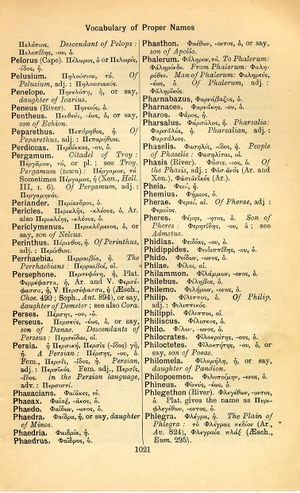Pharnaces
ὥσπερ γὰρ ζώου τῶν ὄψεων ἀφαιρεθεισῶν ἀχρειοῦται τὸ ὅλον, οὕτως ἐξ ἱστορίας ἀναιρεθείσης τῆς ἀληθείας τὸ καταλειπόμενον αὐτῆς ἀνωφελὲς γίνεται διήγημα → for just as a living creature which has lost its eyesight is wholly incapacitated, so if history is stripped of her truth all that is left is but an idle tale | for, just as closed eyes make the rest of an animal useless, what is left from a history blind to the truth is just a pointless tale
English > Greek (Woodhouse)
Φαρνάκης, -ου, ὁ.
Latin > English (Lewis & Short)
Pharnăces: is, m., = Φαρνάκης.
I The name of two kings of Pontus.
A Grandfather of Mithridates, Just. 38, 6, 2; Plin. 33, 12, 54, § 151.—
B Son of Mithridates, defeated by Cœsar, Cic. Deiot. 5, 14; id. Att. 11, 21, 2; Suet. Caes. 37; Luc. 10, 476.—
II The name of a slave of Cicero, Cic. Att. 13, 30, 2; 13, 44, 3.
Latin > French (Gaffiot 2016)
(1) Pharnăcēs,¹¹ is, m. (Φαρνάκης), Pharnace [roi du Pont, vaincu par Pompée] : Plin. 33, 151 || petit-fils du précédent, fils du grand Mithridate, fut vaincu par César : Cic. Dej. 14 || un esclave de Cicéron : Cic. Att. 13, 30, 2.
(2) Pharnaces, um, m., peuple fabuleux d’Égypte : Plin. 7, 17.

